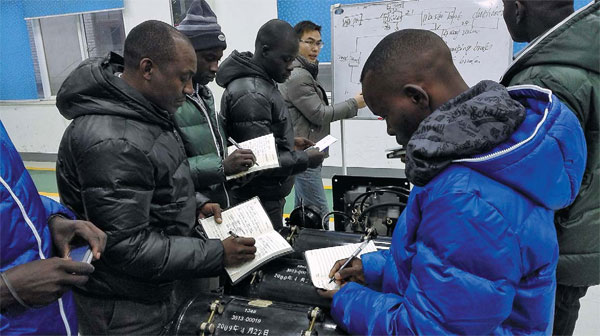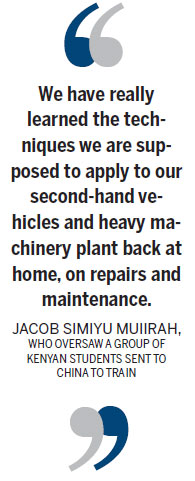Students from Kenya take notes during their training at Shantui, a machinery maker in China's Shandong province. Provided to China Daily

With help from Chinese machinery makers, low-income Kenyan students are learning new job skills
Six years ago, on her first visit to Nairobi, Chen Moran thought she had arrived in heaven.
"The sky was so blue and the green savannah stretched to the end of the horizon."
As the country manager for Kenya for AVIC International, which is controlled by state-owned aerospace and defense aircraft maker Aviation Industry Corp of China, Chen came to Kenya to take charge of the subsidiary's occupational training program in the east African nation. AVIC International has been operating in Africa for 30 years and much of its regional business is in contracting for government projects and renting equipment.
As Chen began visiting universities and factories in Nairobi to see which facilities needed new equipment, the picturesque scenery gave way to a gritter side: the capital's outdated manufacturing and rampant unemployment.

Publicly available figures show that at least 2.3 million young people in Kenya are unemployed, while figures from police bureaus indicate that 90 percent of crimes across the country are perpetrated by suspects between the ages of 16 and 25.
The existing equipment in factories and university laboratories, she says, are legacies from the nation's colonial era and are in poor condition. Most of the training facilities for workers or university students continue to use the decades-old equipment because of limited budgets.
In recent months, educators and experts have been calling for change in Nairobi.
A director from St. Elizabeth Academy in Nairobi said in a TV interview with the Phoenix Channel that the country's education policies were established by a generation of legislators who were unable to see the promise of the digital world.
"The current system just encourages people to finish their degrees and to go get a job and earn money. It doesn't encourage people to acquire technical knowledge," she says.
AVIC International, however, has made major efforts to help remedy the country's soaring unemployment and lack of modern equipment.
In 2009, it began a training program with the Nairobi Youth Service - an organization established in 1964 to reduce youth unemployment - to offer job training to the city's youth, supply hardware and software, and train local teachers. Thus far the program, AVIC claims, has trained more than 15,000 youths, all of whom have found jobs with local companies in Nairobi.
The second phase of the program has the support of a 30-year, low-interest loan from the Export and Import Bank of China that is worth $70 million. The loan allows the Kenyan government to buy equipment from China and pay for training sessions.
Chen says the second phase has a clear focus on training students to operate machinery, such as cranes, and repair them. The Kenyan government bought about 380 heavy vehicles from Chinese machinery makers during the second phase of the program.
Based on an agreement between the Kenyan government and AVIC International, the company employs a team of 12 machinery experts in Nairobi to train low-income students for three months. The team also works with other experts sent from Chinese manufacturers such as Sany, Zoomlion and China National Heavy Duty Truck Group, to provide students with more in-depth knowledge about machinery.
The Kenyan government in turn sends a group of 15 to 20 youths to China every year to learn how to operate different kinds of machinery from the aforementioned Chinese manufacturers. Students selected by the Kenyan government are between the ages of 14 and 20.
When the Kenyan students come to China as part of the exchange program, AVIC International acts as a liaison between the Kenyan government and the Chinese machinery manufacturers such as Zoomlion. A training team is selected from the manufacturers and the Kenyan students work directly in the companies' factories. During their one-month stay in China, they travel across Shandong, Shaanxi and Hunan provinces, where these machinery makers are based, to learn hands-on skills.
"Most are shocked to see how developed China is, and all the students are friendly and keen to learn," Chen says.
This exchange program has also helped the Chinese machinery brands, she says.
"Most African people only know about European brands such as Mercedes-Benz and it is very difficult to change their minds that Chinese products are equally good, only cheaper. But after they visited these factories and saw the advanced production facilities, their stereotypes of Chinese products changed."
Chen says she received a letter from Jacob Simiyu Muiirah, 35, who oversaw a group of Kenyan students sent to China in December. In it, he writes, "For the past weeks learning in these beautiful cities of China, we have really learned the techniques we are supposed to apply to our second-hand vehicles and heavy machinery plant back at home, on repairs and maintenance.
"You have given us knowledge ... that we can transfer to our people back in Kenya."
Apart from the cooperation with NYS, AVIC International also holds a competition among institutes in Kenya in a joint venture with the Kenyan government. In the contest, Chinese machinery makers, including Shaanxi Automobile and Shantui, submit orders to small workshops affiliated with these institutes for specific products. These workshops, which employ students, then manufacture the products and ship them to China for testing. The top two performers receive a total of $100,000 in manufacturing funds from Shaanxi Automobile and Shantui.
"By sponsoring this competition, Shaanxi Automobile and Shantui can also decide if it is possible to start a local assembly plant by using the locally produced parts," Chen says.
The job-training exchange programs are gaining notice from both Chinese and African officials. During his visit to Africa in May, Premier Li Keqiang praised the NYS-AVIC International partnership, while the Zambian government recently began contacting Chinese machinery companies to create similar exchange programs. The Tanzanian government is currently in talks with AVIC International to establish its own job-training plan.
"Currently, the programs are confined in East Africa and West Africa, but we will gradually seek opportunities across the whole continent," Chen says.
AVIC International also has job-training exchange programs in the Middle East and South America.
As manager of the exchange program for six years, Chen says she feels Chinese companies are putting more resources into the African market.
"The number of Chinese companies bidding for the program has increased sharply after we finished the first phase, and companies who attended this program said their sales increased significantly in Kenya."
Shantui, for instance, established a division in Nairobi and has begun building franchise stores after participating in the job-training program.
wangchao@chinadaily.com.cn
(China Daily Africa Weekly 01/16/2015 page9)
 Overhauling China's organ transplant system could take some time
Overhauling China's organ transplant system could take some time
Overhauling China's organ transplant system could take some time
